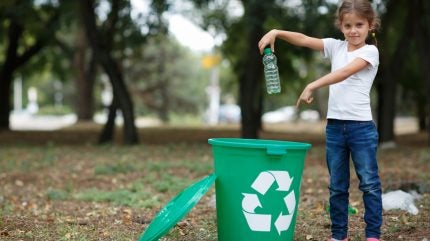
The UK government has confirmed a £1.1 billion funding package to support councils across England in upgrading their local recycling services.
The funding aims to help local authorities roll out weekly food waste collections and enhance the consistency of recycling across the country, in line with upcoming reforms to waste management regulations.

Discover B2B Marketing That Performs
Combine business intelligence and editorial excellence to reach engaged professionals across 36 leading media platforms.
Weekly food waste collections to become standard
Under the new plans, all homes in England will be required to have access to weekly food waste collections by 31 March 2026.
The funding will support councils in setting up or expanding the infrastructure needed to deliver this service, including the purchase of new food waste bins, collection vehicles and staff training.
The Department for Environment, Food and Rural Affairs (Defra) stated that making weekly food waste recycling universal will significantly reduce the volume of biodegradable waste sent to landfill.
Food waste is one of the largest contributors to methane emissions from landfill sites, making the initiative a key part of the UK’s net zero strategy.

US Tariffs are shifting - will you react or anticipate?
Don’t let policy changes catch you off guard. Stay proactive with real-time data and expert analysis.
By GlobalDataFunding supports consistency in household recycling
The £1.1 billion investment will also help councils meet new requirements for household recycling collections. These reforms, due to come into effect in 2026, will standardise the types of materials collected at the kerbside across England.
All local authorities will be expected to collect glass, metal, plastic, paper and card, food waste and garden waste separately from general rubbish.
Defra said the move is intended to simplify recycling for households and improve material quality for reprocessing.
The funding will help local authorities adapt their existing collection systems and invest in necessary infrastructure such as sorting facilities.
Measures designed to reduce landfill and increase recycling rates
According to government estimates, around 1.5 million tonnes of biodegradable municipal waste were sent to landfill in 2020. Ministers believe that improved recycling services and separate food waste collections will reduce pressure on landfill sites and cut greenhouse gas emissions.
Environment Secretary Steve Barclay described the investment as a step towards delivering “a simpler, easier and more effective recycling system.”
The changes form part of the government’s wider Resources and Waste Strategy, which includes reforms to packaging waste and producer responsibility.
The funding will be distributed directly to local authorities, with allocations based on need and current service levels. Councils will have flexibility in how they deliver the services, provided they meet the core requirements set out by Defra.





